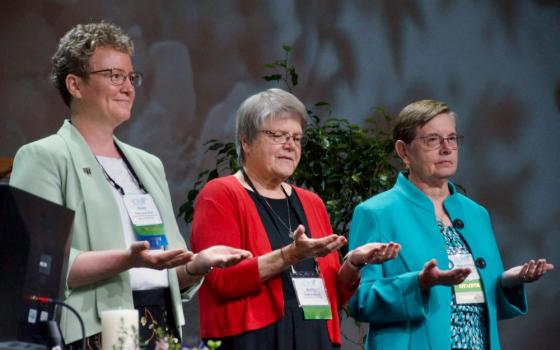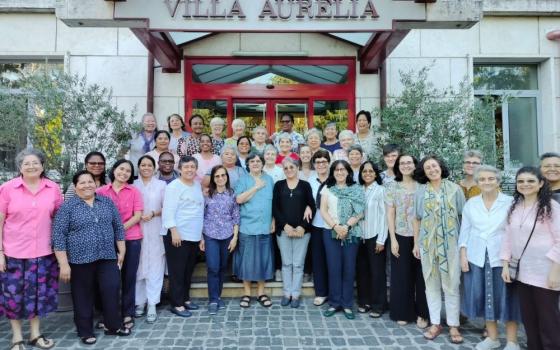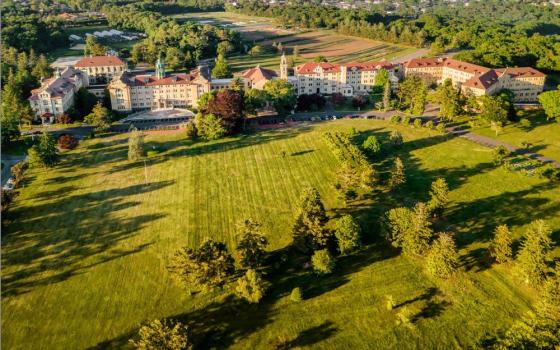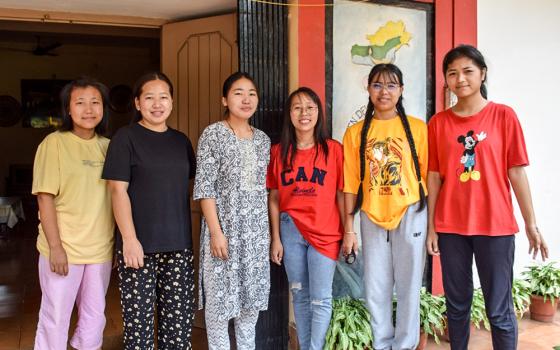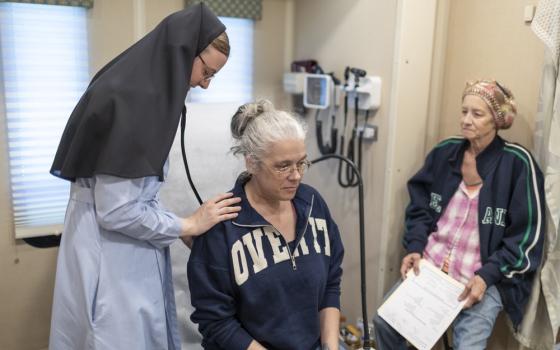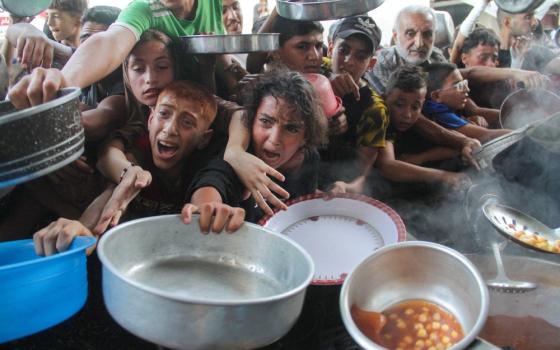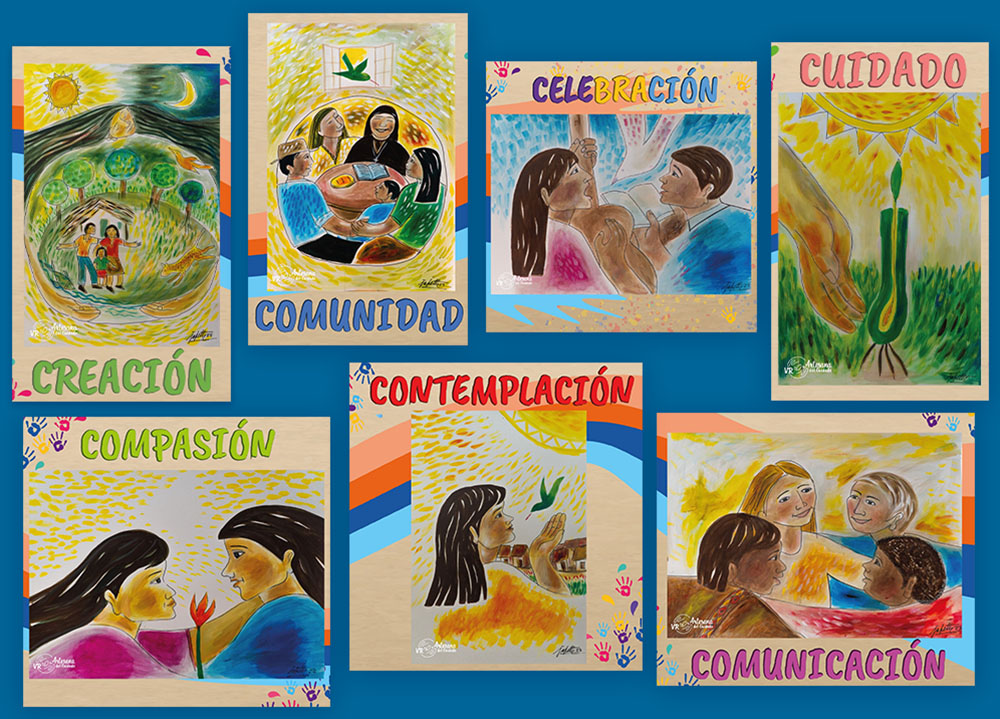
Colombian artist Jafeth Gómez created paintings representing the seven C's during the IV Latin American and Caribbean Congress of Religious Life, held Nov. 24-26 in Bogotá, Colombia. (Courtesy of CLAR)
How many times have we experienced confusing, perhaps painful situations in religious life? Sometimes we have witnessed situations that make us question why we continue to remain in our church, or even in our institutes.
Company of Mary Sr. Liliana Franco, president of the Confederation of Latin American and Caribbean Religious, known as CLAR for its acronym in Spanish, referred to these situations as those that "deny what is human." That is why, when listening to her welcome greeting at the beginning of the IV Latin American and Caribbean Congress of Religious Life, I felt totally engaged and united to the situation of so many sisters from all over our American continent.
Different topics were addressed during this congress, "Artisans of Care," held Nov. 24-26 in Bogotá, Colombia, all inspired by the need for care and, therefore, communion. Global issues such as war, corruption and forced migration were named and addressed from a caring perspective.
The congress also delved into the need for conversion and reform, recognizing past mistakes, including institutional abuses and rigidities. However, all of this was set in a context of hope.
Advertisement
Sr. Teresa Maya, a member of the Congregation of the Sisters of Charity of the Incarnate Word in San Antonio, discussed in her presentation on the second day that in order to arrive at a prophetic hope, it is necessary first to name the reality, and then to face mourning.
She explained that perhaps fear has kept us in "Babylonian lamentations." However, it is necessary to recognize that we have a small faith that is not enough to explain nor to console everything, but we hope, with our community, that God will console us.
She also mentioned that it is good that our faith is small because "then we really need God."
Many communities have enormous distrust in the face of generational change and fear of the future. Within that context of fragility and uncertainty, Maya challenged us by asking the question, "What is your history with fear?"
Several days have passed since the congress in Bogotá, and the question still resonates within me. The entire experience at the congress filled me with hope, something that I had not felt for a long time.
The last two congresses I attended in the United States focused on the transformation of consciousness, mystical wisdom or cosmic spirituality. Perhaps I am too young, or maybe it is my Latin American spirituality, but that spirituality did not fill my heart with hope.
In this congress, I witnessed the see-judge-act methodology in action. We first observed the reality, with all its problems and without any concealment. Then, everything was analyzed in the light of the Gospel, and, finally, we were exhorted to concrete commitments.
Alongside more than 500 in-person attendees and 3,000 online participants, we reflected on the need to not abandon contemplation, to continue seeking God as women of the dawn, and not shy away from the challenge of looking at ourselves as God sees us.
I returned from the congress renewed, convinced that this religious life is worth living. Despite our dwindling numbers, I want to live my calling authentically, bearing witness not only to the people I serve but also to the sisters in my own community. With them — and only with them — can I transform my frailties in order to become a true "artisan of care."
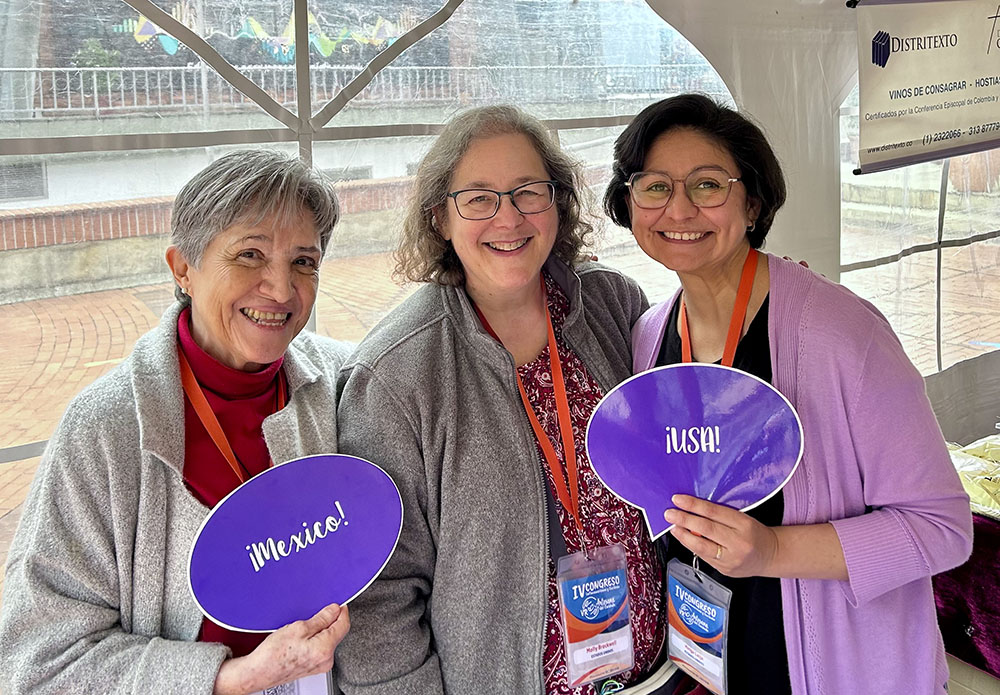
Benedictine Srs. Maricarmen Bracamontes, Molly Brockwell and Helga Leija at the IV Latin American and Caribbean Congress of Religious Life, held Nov. 24-26 in Bogotá, Colombia. (Courtesy of Molly Brockwell)
This was the invitation of the congress: to be artisans of care. And within this C of care, we committed to six others:
- The C of compassion: Where we commit ourselves to develop compassionate minds and hearts, caring especially for the most disadvantaged, as part of a Samaritan church that listens, accompanies and works for restitution and reparation.
- The C of Communication: Where we commit ourselves to prioritizing symmetrical communication between believers and other cultures, assuming the challenge of incorporating new languages, narratives and technologies to recount the good news in a fresh way.
- The C of Contemplation: Where we commit ourselves to orienting our lives toward the heart of Jesus, allowing the Gospel to guide all our steps. By opening ourselves to contemplation, we give him the space to shape our being and allow us to follow him in our permanent commitment to the kingdom.
- The C of Creation: Where, recognizing the socio-environmental crisis, we commit ourselves to taking care of our common home with concrete gestures and processes, such as expanding solidarity networks in the Amazon territory.
- The C of Community: In which we commit to not close ourselves to the presence and action of the Holy Spirit and to recognize him as the giver and nurturer of life, promoter of diversity and builder of communion. It is the Holy Spirit who renews us in community.
- The C for Celebration: In which we celebrate life and victory over death, as well as the continuity of the cause of the kingdom, sharing the joy of announcing that Jesus is alive and that it is worthwhile to go on.
In the end, I can say that the IV Latin American and Caribbean Congress of Religious Life ignited a fire in my heart. I feel encouraged and supported by the spirit of synodality and determined to transcend all those dynamics and relationships that deny what is human. I will do so with a gentle disposition of my heart, and by putting others first, receiving them as Christ himself (Rule of Benedict, 53) and listening to them with the ear of my heart (Rule of Benedict, prologue).
Thank you so much, CLAR! ¡Muchas gracias, Bogotá!

